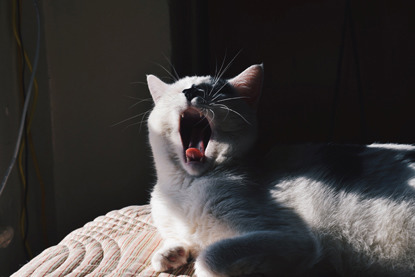Vet Dr Sarah Elliott explains why a cat might not purr and how much your cat should eat.
In our latest live Q&A on Facebook, Cats Protection vet Dr Sarah Elliott answered a variety of veterinary questions from curious cat owners, including why a cat might not purr and how much your cat should eat.
Here are just some of the topics discussed:
One of my cats has never purred… is that normal?
Cats have not been domesticated very long in terms of evolution, unlike the dog. The cat's wild ancestors would have lived solitary lives and did not need to interact with each other or to develop sophisticated vocal signals – they would have been fairly silent unless with kittens or mating! So the lack of purring may well just be normal cat behaviour for your cat.

Cats should have an annual vet visit to check their teeth
Can you give some tips to ensure good dental health for my cat?
All cats should have an annual vet visit to check the status of their teeth. Unfortunately even with the best diet and dental care, cats are still quite prone to dental disease. There are a number of things you can do to help keep your cat's teeth healthy.
Brushing teeth daily with a toothpaste specifically designed for cats will help to reduce the build of plaque and tartar and help to keep the gums healthy. There are a variety of toothbrushes to choose from such as finger brushes, microfibre cloths for your finger and full-length pet toothbrushes.
There are specific dental diets designed with bigger kibble available from your vets to help clean teeth, along with solutions and natural supplements to add to your cat's food and water which may help prevent dental disease.
I'd recommend speaking to your vet for more information and you may find our Teeth and Oral Health leaflet useful.
My cat sneezes quite a bit but shows no other symptoms. Is he ok?
The sneezing will be down to an irritation within the nose. This could be caused by an irritant like dust, or an allergy, or an infectious agent like a viral or bacterial infection. Some cats can develop polyps or growths inside their nose – this is more common in older cats. It’s best to get him checked out to rule out something more serious, and to relieve any discomfort he may be experiencing.
My cat has just turned one and she is getting a bit of a saggy belly.
She eats a 400g tin of food a day. How much is healthy for her to eat daily?
How much you should feed your cat really depends on the age of the cat, whether the cat is overweight or underweight or has any particular medical requirements that may their influence diet. Most vet clinics will offer a weight clinic to help advise on the right diet for your cat and most good quality cat foods will have a feeding guide on the packaging.
For food-obsessed cats, feeding using puzzles may help. Have a look at the videos in our boredom busters playlist:
These websites have some good ideas too:
There are many ways of creating handmade feeders. Scatter feeding and tossing single treats is a start. Place food in different locations and at different heights as well.
Microchip feeders can help limit how much food your cat can eat if your cats are microchipped.
I’ve noticed that my three-year-old cat is drinking a lot.
Any cup you put down, he's straight in it. I have changed his food from wet to dry around one or two months ago – could this be why or is it worth a trip to the vets?
Cats have desert-dwelling ancestors and as a consequence may not feel the urge to drink as readily as we do. Cats on a wet diet will get the majority of their water from their food. It might be that you have noticed more drinking due to the change to dry food.
As a general rule, a cat’s normal water intake varies from 20-70ml per kg a day. If the drinking seems excessive, it is always worth checking this with your vet in case there is an underlying medical cause.
Veterinary note: Please note that we are unable to give specific advice on your cat's health or any change in behaviour observed. For medical problems, consult your vet who will have access to your cat's medical history and will be able to examine them.
Would you like to ask one of Cats Protection's feline experts a question about your cat? Don't miss the next live Facebook Q&A sessions: chat with Behaviour Manager Nicky Trevorrow on 22 December; or vet Dr Sarah Elliot on 26 January. All Q&As are held on Cats Protection's national Facebook page from 2-3pm. See you there!
